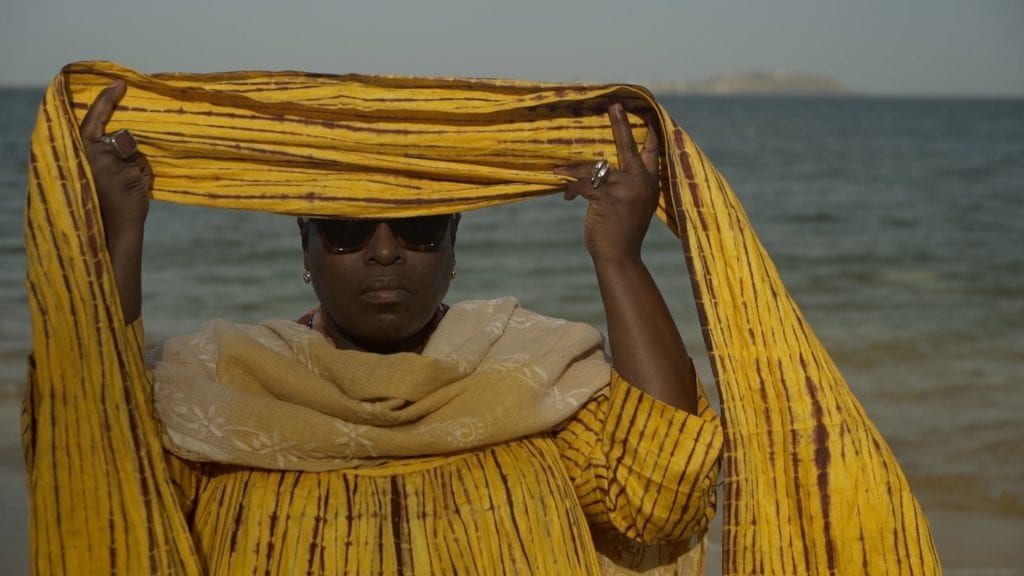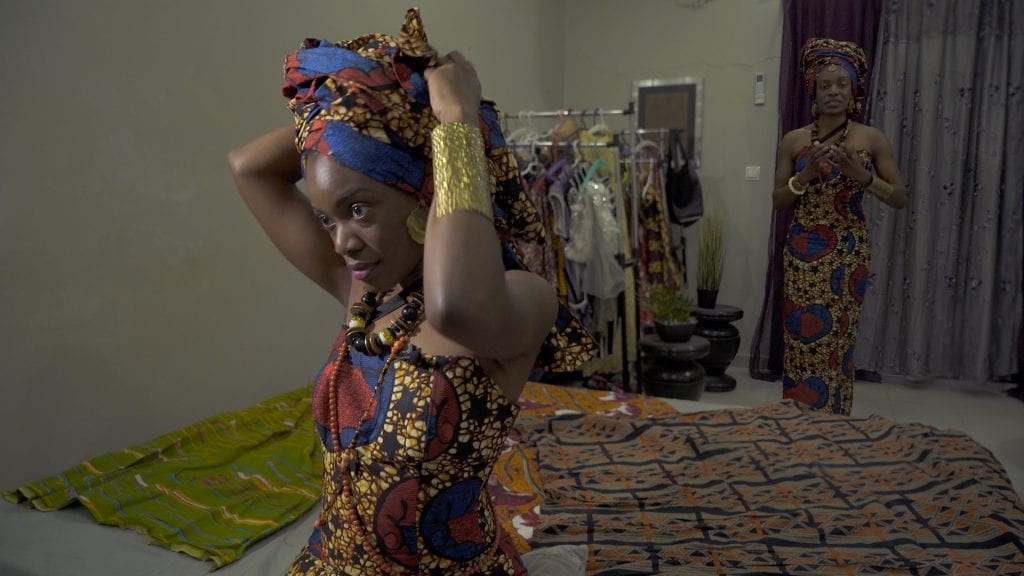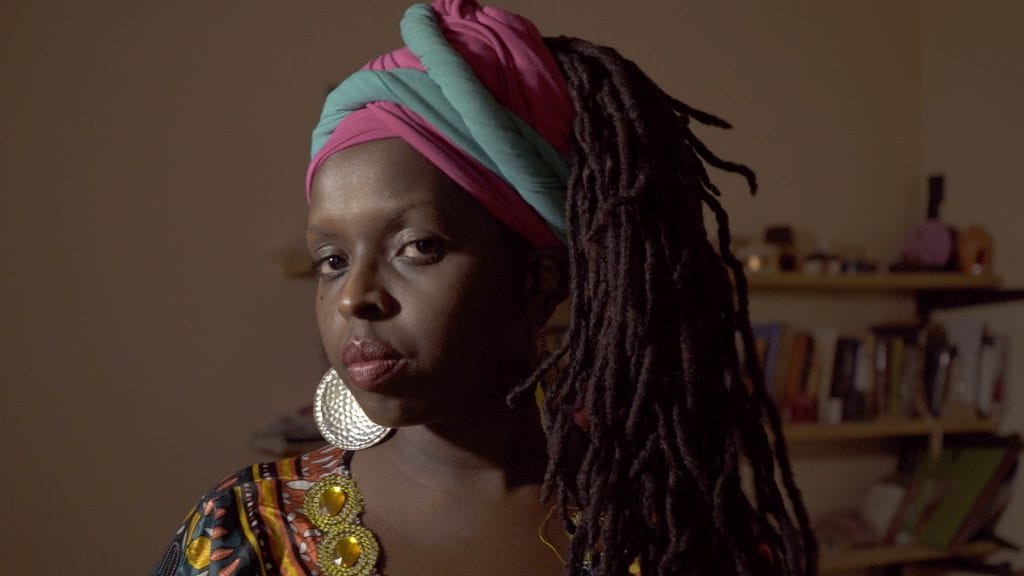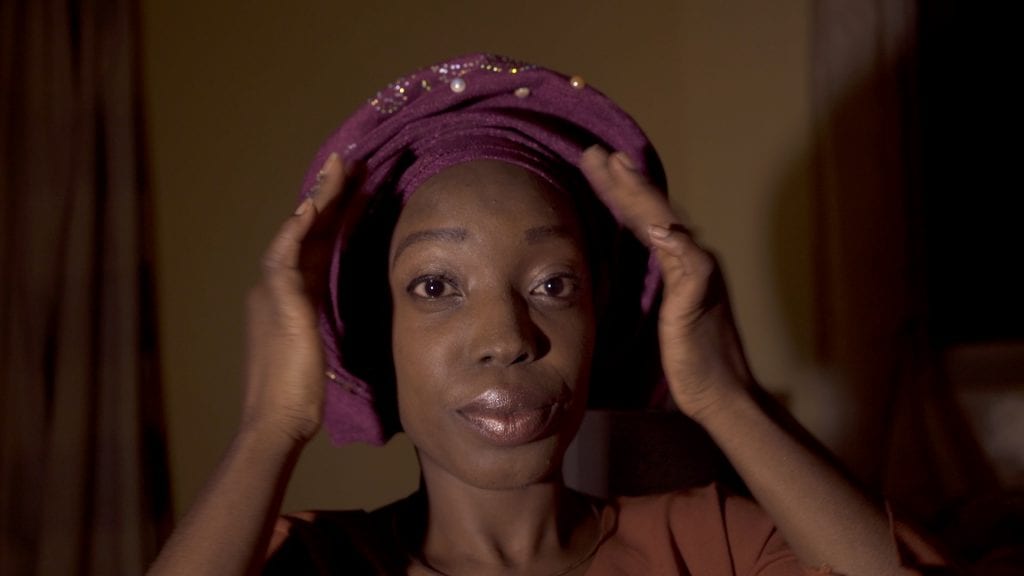I am Chika Oduah, the poet and the maker of the film for the poem, “The Beautiful Load.” I am a journalist, writer and photographer. Much of my work centers on reporting news- terrorism, insecurity, women’s rights, poverty and development – in Africa. I take a creative approach in my work and my goal is to capture the experiences of people of African descent through poetry and journalism.
I grew up watching my mother tie huge pieces of fabric on her head. I’d stand watching my mother’s reflection in the bathroom mirror as she firmly held the ends of crisp fabrics with her hands. I would silently observe her in wonder. She was the creator before me and with an unseen power, she’d bend that thing, place it down and lift it up, wrap it around and drop it back, pull it like rope and then caress it like a child. And at the end of the creation process, her ichafu would glow like the crown on her head that it was.
After watching her for years, I began to try on my own. I’d begin first closing my eyes and cast a vision of what the end should look like because I always knew how I wanted the end to look like. I preferred the tall, stalk-like shapes, whereas my mother liked hers round. Then in the beginning, I’d transform into a creator. We all know that the woman is the ultimate creator. I’d transform lowly cloths into splendid coronets. And at the end of it, I’d feel that connection to my mother and to other women like you, like me, to the women I never met and to the ones whose blood give me life.
Across Africa, women tie this humble piece of fabric of their heads. Across oceans, black women separated by waters that carried our ancestors to new worlds in chains, waters that cover the swollen bodies of our ancestors who jumped ships or just never made it across… across oceans, black women wear head ties.
I wanted to write a poem as an ode to the headtie. I wanted to celebrate African women through the symbolism of this piece of fabric that African women turn from something simple to a coronet of cloth. The idea for the film came in tandem with the poem. I wanted the film to glorify the beauty of the African woman’s headtie. I thought about filming a diverse set of African women to represent how the headtie is worn in various ways. I wanted the women to silently tie their scarves in their bedrooms, because that’s where they would normally tie them. The women tying her headtie on the beach represents the diaspora. Water is significant because it is water that separates black people and it was water that transported millions of enslaved Africans to the new world.




The beautiful load
By Chika Oduah
She starts
in her mind
intent
to create
she’s a creator
the ultimate one
licensed
browned
blackened
blessed
gifted
melanin tinted
authorized by the divine to do it
with her breath
we are
from her body
we come
full-formed
shrieking
and woke
lathered in her sticky amniotic waters
with her hands
she’s pleating
folding
she’s shifting
bunching
gathering
pushing away the unnecessary
tucking into herself the necessary
to fortify herself
tying
loose ends
that go nowhere
but she takes them somewhere
‘round her head
the African woman
making something out of nothing
and calling it for many tongues
ichafu for the Igbo
moussor for the Wolof
kitambaa cha kichwa for the Swahili
tignon for the Creoles
tukwi for the Tswanas of Botswana
duku for the Ghanaians
chitambala for the Zambians
gele for the Yoruba
we make this thing
and with every grimace of her face
to make this thing
with every grimace
in which
her lips contort
and her brows crinkle
and her shoulders sag under ungodly
burdens
and her back aches with the after shocks of men attacking her earth
and her nights tormented by ungodly
nightmares
and her pride bruised by racist blows
with every grimace of her face
she forges ahead
with her head up
and when it falls
short of her expectations
of what she needs it to be
she tries again
wrapping that load ‘round her head
turning a load
into something bold
that speaks
echoing
what her
great and even greater grandmothers spoke when they defied
what foreign men were telling them
while forcing their way to have sex to them
claimed that they were not beautiful
called them niggers and made them feel unsightly
the black stain to their white clean
because they didn’t understand the beautiful things
that African women were creating for their heads
to wear
because inside the head
is her mind
the chest of her thoughts
so it needs to be pristine
she, we leave them there for safekeeping
bring them out when we’re needing
to evoke and invoke
create and conjure
curse bless rejoice and pray
amen and ameen
ise and
às̩e̩
it is so
it is so that we were made to feel like slaves
taken from places of birth
they tried to strip the glory right off of our backs
strip, break and pulverize it into morsels of nothingness
and make us forget places of our birth,
our nests
and even there in lands far from home
African women toiling in the fields wore it
they thought it was her badge of enslavement
of lowliness
of
pick-a-niggers
of
black Mammy personified
and Aunt Jemima stupified
but
we got it back
the glory,
because they’d
tucked it away
and
gave it to their daughters
preserving it in the folds of the fabrics
that African women mount to wear on their heads
to protect the most powerful place of her body
her head,
the gateway to her mind,
the one they try to mess with whenever she places her foot
to step it forward
and the other one forward
they’ve toyed with her mind,
lit a flame of lies and myths ‘round it
to degrade downgrade demean defile debase demote disgrace
the African woman
but they forgot
that she keeps her glory folded between the wraps of the fabric
that she wraps to wear
‘round her head
and that load of magnificent beauty atop her head
protects the most important part of her body
her head
the gateway to
her mind
she starts creating
in the mind
and what you end up staring at
is the coronet of cloth
the beautiful load on her head
and it is good
it is so
ise